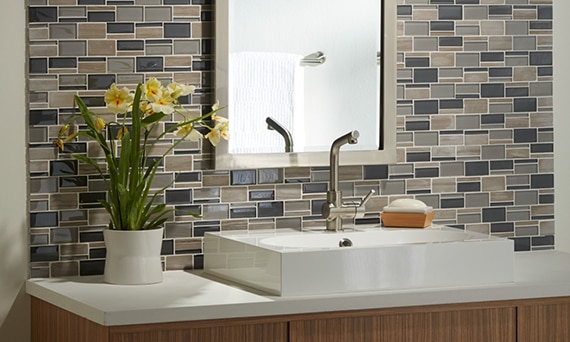
CARING FOR & MAINTAINING GLASS & METAL TILE
GLASS TILES
For routine cleaning, use any non-abrasive cleaning product recommended for either glass or tile. DO NOT use scouring pads, steel wool, sandpaper or other abrasive products.
METALLIC TILE
To clean, use a liquid non-abrasive household cleaner. Avoid cleaners containing ammonia, bleach, abrasives or other hazardous/polluting compounds. Always test in a small inconspicuous area when using a new cleaner to ensure compatibility with your metallic tile. DO NOT use scouring pads, steel wool, sandpaper or other abrasive products.DISCLAIMER
CARE AND MAINTENANCE GUIDE
American Olean does not manufacture installation products or countertop cleaning/maintenance products. American Olean provides the information on this page to its customers as an information source only. Please contact an installation product manufacturer directly, PRIOR to usage, to obtain proper handling instructions, application instruction and warnings concerning potential health hazards for any product contemplated for use.
To ensure your natural stone products will provide you with a lifetime of beauty and utility, proper maintenance is crucial. Natural stone products are porous by nature and require a different maintenance program than traditional ceramic tile. American Oleanalso strongly recommends testing a small area PRIOR to usage of any installation/countertop cleaning/maintenance product to determine whether the product serves its intended purpose.
SAFETY PRECAUTION TO CUSTOMERS
The products described in this document may have chemicals that cause reactions in certain individuals. American Olean strongly recommends the use of safety glasses, respirators (masks) and gloves in handling any materials that contain chemicals. American Olean recommends the proper disposal of any scrap tile/stone, installation and/or maintenance products discussed herein.
Natural stone has unique qualities that not only distinguish it from man-made materials, but also should be considered in selecting it for a particular project. Stone is not manufactured; it is a product of nature. Blocks are removed from the quarry, slabs are cut from these blocks, and the slabs are further fabricated into the final stone to be installed. Each block is different; each slab is different. Skillful blending or matching of the dimension stone blocks, veneer panels, tops, etc., results in a beautiful blending of nature’s variety and man’s design. “Uniformity of material,” when applied to natural stone, is a term of relative value that needs to be understood when making a selection.





